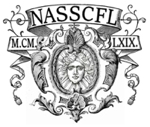In 1659, Cardinal Mazarin commissioned an opera for the upcoming wedding of Louis XIV to the Infanta Maria Theresa of Spain. Written by Venetian composer Francesco Cavalli, Ercole Amante premiered three years later to little success. Henry Prunières and Jérôme de La Gorce attribute this poor reception, at least in part, to anti-Italian sentiment at court following the death of Mazarin in 1661. This conclusion is problematized by the continuing debate over whether Ercole Amante is an Italian or French opera. I approach this question by studying the publication, distribution, and reception of the opera text. By examining the 1662 libretto published by Robert Ballard, I argue that Cavalli's opera is marketed as a product by and for the glory of the French nation. However, its multilingual mise-en-page assigns a transnational identity to the work. I conclude that this hybrid national identity doomed Ercole Amante to obscurity.
|
Francisizing Opera: Ballard and the Printing of Cavalli's Ercole Amante
1 : The Pennsylvania State University and Université Lumière Lyon 2
|
| Personnes connectées : 1 | Flux RSS |

|

 PDF version
PDF version